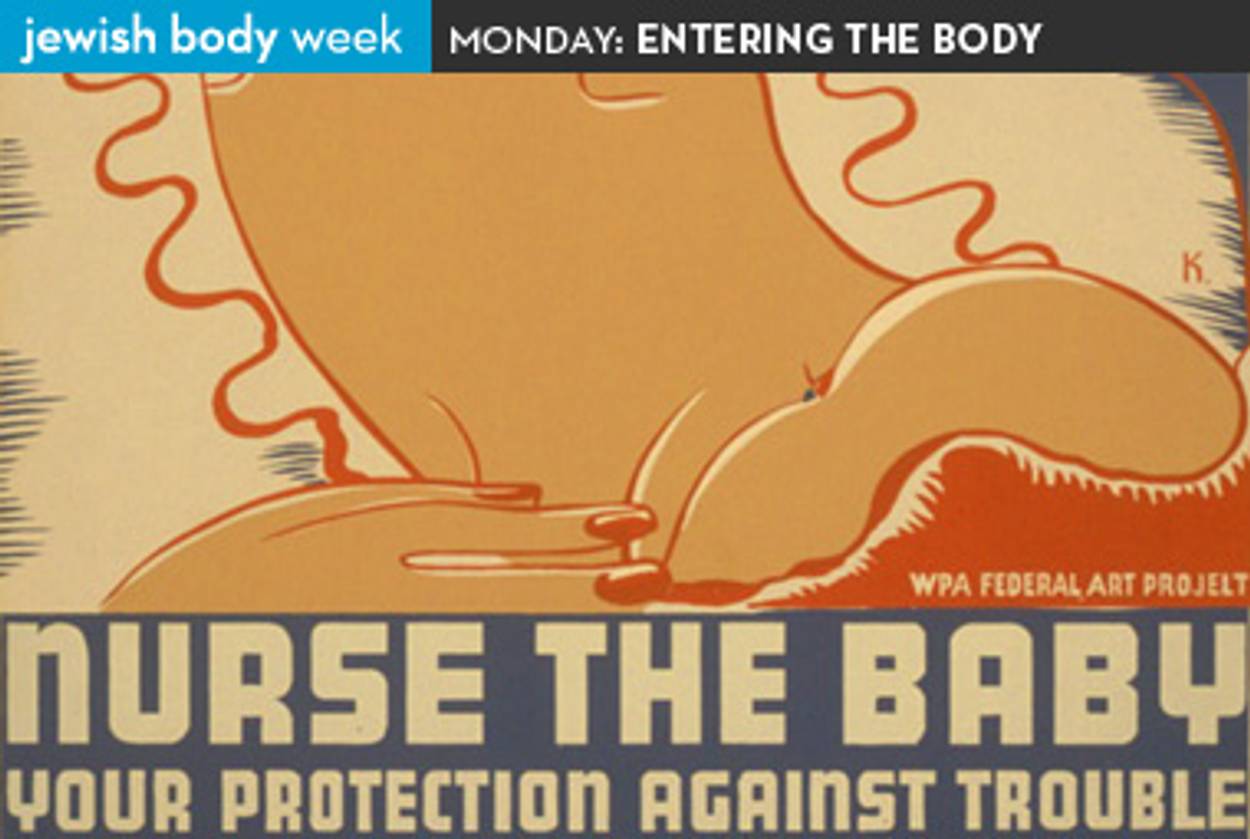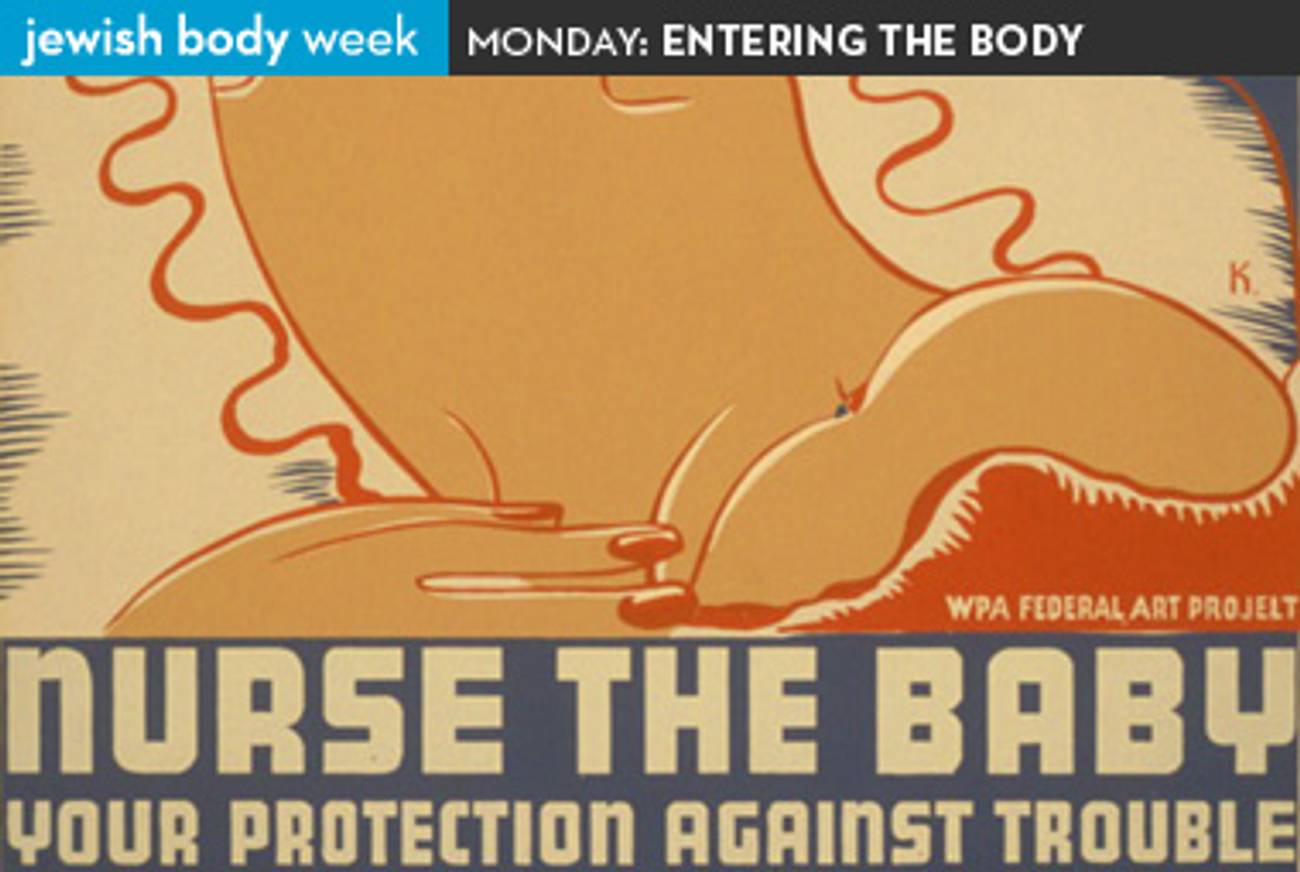Bottled Guilt
How the debate over breastfeeding is driving us crazy




We are Jewish women. We are high achievers. Many things have come easily to us. We can bring home the Faken; fry it up in a pan.
Which means that when we fail at something supposedly so easy any mammal can do it, we feel horrible.
Breastfeeding is supposed to be a cinch. We educated ladies of Hebraitude know it’s expected of us. The American Academy of Pediatrics recommends exclusive breastfeeding for six months. Research indicates that breastfed babies have less diarrhea and fewer colds and ear infections than formula-fed babies. They’re less likely to die of Sudden Infant Death Syndrome, less likely to have lymphoma. And of course we want our children to grow up strong and healthy enough to withstand our powerful Jewish Mother Guilt Rays.
To a great extent, we’ve gotten comfortable with our ability to tame our Jewish bodies. We can straighten our curly hair; diet or exercise or Spanx our butts into submission; depilate or wax or laser our swarthy body hair into oblivion. So when our bodies betray us, it’s a shock.
My sister-in-law, struggling to nurse twins, called the La Leche League, an international breastfeeding support group, for help. The woman on the phone told her, “Breast milk is like a blood transfusion for a baby. Formula is like a hot dog and fries.” A good friend of mine was told in disbelief by another mom, “Your kids seem healthy and smart, and they weren’t breastfed!” (My friend pointed out that actually, two of her four children had nursed a bit. The woman smiled and said, “Oh, but you cheated with formula, right?”) Another friend called a lactation consultant, sobbing, worried that her newborn daughter (who was born with a pinched nerve in her neck, leaving her unable to nurse) was starving on the meager amounts of breast milk she was able to pump and feed through a tube. The lactation consultant urged my friend not to give her hungry baby formula. “It’s like feeding her poison,” the consultant said in a hushed voice. “It will damage her kidneys and take three months to get out of her system.” My friend worked herself into a frenzy, pumping every two hours, waking the baby constantly to get her to eat, crying regularly.
Jewish mothers, according to our ancient cultural portrayal, are mega-nurturers, urging our babies to eat, eat, eat. If our 90-year-old Biblical matriarch could nurse a child, what the hell is wrong with us? A midrash from the Babylonian Talmud says that Sarah was so womanly, her breasts were two fountains that flowed with enough milk to feed all comers. When this old lady miraculously produced a baby, the story goes, people muttered that Isaac was actually adopted. (Need I add that this tale may resonate painfully with Jewish women who delayed childrearing for work or education, or who may have trouble conceiving and feel berated by the commandment to be fruitful and multiply?) To prove that Isaac was hers, Sarah breastfed all the children in the neighborhood. What kind of loser modern Jewess can’t make enough milk for even one measly baby? And hey, don’t think adoptive moms are exempt; you ladies could damn well nurse if you tried hard enough. That is, if you really cared about your babies and weren’t such selfish bitches. (Memo to the slow: save your email. We call this sarcasm.)
And then there is the One True Breast. One of the many names for God, Shaddai, may be a reference to breastfeeding. (The Hebrew word for breasts is shaddaim.) No one knows the origin of this divine name, but it may well be a reference to an earlier fertility goddess. Part of godliness is nurturing a people from your own body and soul—it’s the mother-child dyad writ large.
Despite some lactivists’ insistence to the contrary, there are women who simply can’t breastfeed, such as those taking certain medications or who’ve had breast surgery. And though making too little milk is generally called “mismanagement” (hey, no judgment there!) it’s a reality. According to Lisa Marasco, an expert on insufficient milk supply and a professional liaison for La Leche League of Southern California/Nevada, reasons for low milk supply can include polycystic ovary syndrome (PCOS), hypothyroidism and severe postpartum bleeding. Interestingly, Marasco points out that fertility treatments may also play a role. “In the past, some women might not have been able to get pregnant or give birth,” she writes. “[I]t may be that just because science can get you pregnant, it can’t make you able to nurse a child.” Postpartum depression or stress can certainly be factors too, and nagging doesn’t help. We’ve all had friends who tried to nurse exclusively, but wound up in a sobbing heap on the bedroom floor at 5 a.m., sending their partners out for formula. Finally, if a baby latches improperly, over the long term he or she may not get enough milk and nursing will hurt the mother like a mofo. Lactation consultants may be able to help. Or not.
In any case, it’s unfortunate that women are guilted for not nursing when a big chunk of blame should fall on our culture. Family-leave policies in the U.S. lag far behind the rest of the industrialized world. A survey of 16 European countries and Canada found that these countries provide an average of 68 weeks of maternity leave, with 33 of those weeks paid. Jewish women, like all women, may well have to return to the workforce sooner than we’d like. That’s particularly true in this economy. And then there’s the fact that not every workplace or life is conducive to pumping.
The upshot: don’t judge a woman until you’ve walked a mile in her post-partum granny panties.
We Jews are, I think, particularly susceptible to judgment and guilt. We are a competitive lot. Just as we pore over the work of Dr. Sears and Dr. Weissbluth as if it was the Talmud, act as if sleep training and toileting are matters of life and death, obsess about whether our little angel is hitting his developmental milestones faster than the nearest similarly-aged baby at Tot Shabbat, drey about getting our kid into the “right” school, we want to excel at nursing. Recent research showing that formula isn’t poison doesn’t really have an impact on maternal emotions this profound. And we turn our anxieties outward, guilt-tripping other women, because of our own insecurity. The breastfeeder rolling her eyes at the baby with a bottle or pacifier may have her own mishegas. Maybe it’s about feeling invisible, about not having a career, about not feeling able to voice her resentment over feeling distant from her husband because of the intensity of her intimacy with her child. Who knows? I do know that we channel our own ambivalence outward; we turn parenting into a vicious contest. As one doctor I interviewed laughed, “Guilt begins at conception!” We’re all looking for the magic bullet, the amulet, the hamsa, the mezuzah, the one thing we can do to insure safety in an unsafe world. And some of us fixate on nursing as that one thing.
Marjorie Ingall is a columnist for Tablet Magazine, and author of Mamaleh Knows Best: What Jewish Mothers Do to Raise Successful, Creative, Empathetic, Independent Children.
Marjorie Ingall is a former columnist for Tablet, the author of Mamaleh Knows Best, and a frequent contributor to the New York Times Book Review.